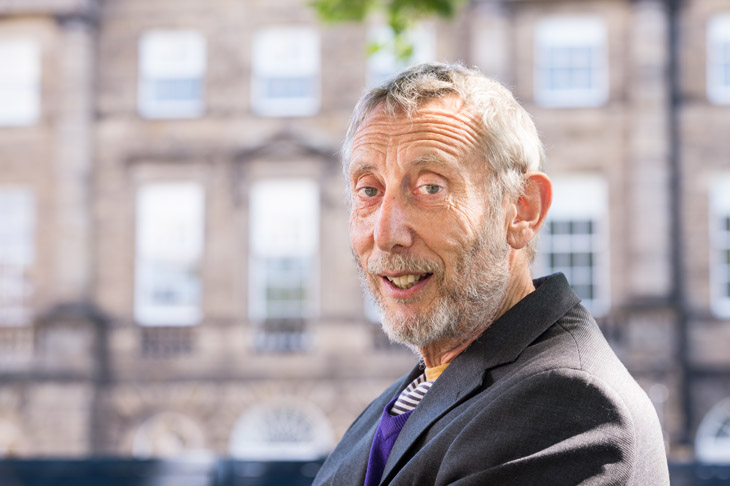In 1952, the five-year-old Michael Rosen and his brother were taken on holiday along the Thames by their communist parents. The coronation was approaching, and the trip was an effort to ‘ignore it away’. All went well until they reached Wallingford, where Rosen’s father and a friend visited a pub, not knowing it had a TV set. They entered ‘at the very moment the Archbishop was putting the crown on the Queen’s head. The whole purpose of the punting holiday was ruined.’
His family’s political convictions are a recurring theme in Rosen’s account of his childhood and university years. Their experience was typical of many Jewish people at the time: branches of the family in Europe had been wiped out by the Nazis, driving the survivors not only abroad but leftwards. Rosen’s father pronounced ‘bourgeoisie’ as ‘buggers are we’, and held Tuesday night Communist Party branch meetings at his flat in Pinner. When (as sometimes happened) no one else turned up, Rosen’s parents went ahead with the meeting anyway.
His father had been born in the US, and so joined the American rather than the British Army. While stationed in Berlin after the second world war he was charged with writing a history of the Army’s occupation of that city. ‘Somewhere deep in the archives of Omgus (Office of Military Government, United States),’ Rosen points out, ‘sits a report, written by someone who would come to be called in the following decades a “card-carrying member of the Communist Party”.’ For a while, the young Michael assumed that everything good — for instance the butcher his family used — must be communist, ‘until one day I was playing football with the butcher’s son and he said that his dad said that we should drop the bomb on Russia’.
Rosen’s description of his schooling shows what a horrible place 1950s Britain could be. His primary school playground was segregated by gender: a girl got into trouble for handing him a skipping rope across the line that ran down the middle. Pupils were taught the spellings of words but not their meanings. ‘We coughed up piles of facts’, says Rosen — the best phrase I’ve ever read about Britain’s absurd text-based approach to education. And his classmates’ rebellion against a teacher who beat them was inspired: they indulged in invisible humming, ‘delivering volleys of quiet droning sounds, with our mouths just a tiny bit open and smiling so that it was impossible to spot who was droning’.
There’s plenty of cultural theorising as Rosen relates how his literary, theatrical and musical tastes developed. Some of this gets a touch heavy, though thankfully the batteries in his pseud-alarm are tested on a regular basis. He and his brother laughed at a book called What Happens in Hamlet, primarily because it was longer than Hamlet. He knew that the 1960s folk music scene could be over-earnest: ‘There’s nothing more lethal for entertainment than being told you ought to like it.’ An early lesson in plain talking was provided by his father, who on a family visit to Zeffirelli’s Romeo and Juliet remarked: ‘That Juliet’s quite broad in the beam.’ It was Judi Dench.
Rosen is now 71, an age when people are told they should be ‘writing it all down’. Unlike most, he has; and while some sections will only be of real value to the relatives mentioned in them, he’s too good a story-teller for this book not to be worth your while as well. There’s the corned beef scare during an outbreak of typhoid in South America: Rosen’s mother had tins of the stuff, and after worrying for a while she decided to eat them — but only after the outbreak was over. There’s his father, during a holiday to France, nipping over the border to get some cheap fags in Spain. On his return, a policeman asked whether he’d bought anything, only for Michael to pipe up: ‘Don’t forget to tell him about the cigarettes!’ And there’s the tale of Maurice Bowra, Warden of Wadham, Rosen’s Oxford college. Students were locked in at 11p.m., but could sneak out along a route that included Bowra’s sitting room. One night an escapee, realising that Bowra was still there, dived behind the sofa. He stayed hidden for two hours, breathing as quietly as possible. Finally Bowra got up and left the room. Reaching the door, he said: ‘Turn the light out when you go to bed.’






Comments